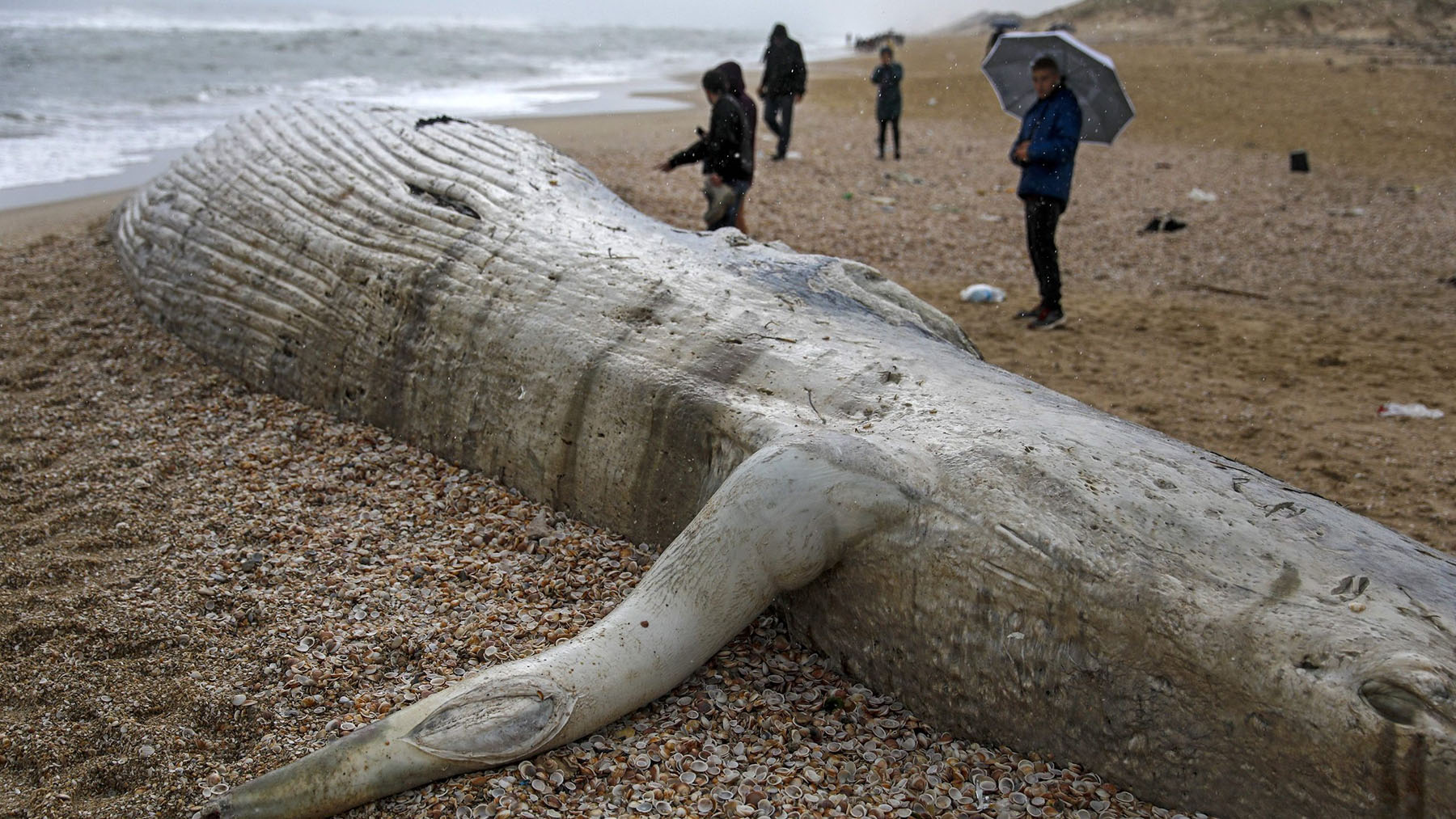 People gather around a dead fin whale that washed ashore on a beach in the southern Israeli city of Ashkelon on February 19, 2021. (Ahmad Gharabli/AFP via Getty Images)
People gather around a dead fin whale that washed ashore on a beach in the southern Israeli city of Ashkelon on February 19, 2021. (Ahmad Gharabli/AFP via Getty Images) A major tar spill off Israel’s coast has drenched much of its scenic Mediterranean shoreline in black refuse that could take years to clean up, environmental experts have warned.
According to the Israel Nature and Parks Authority, some 170 km (105 mi) out of 190 km (118 mi) of Israel’s beaches have been damaged by the offshore oil spill, marking one of the worst ecological disasters in the country in over a decade.
Once this is in the food web, it takes even years to remove and to clean. It’s really a long-term issue.
“It’s awful,” Prof. Maoz Fine, a marine biologist at Bar-Ilan University and the Inter-University Institute for Marine Sciences in Eilat, told The Media Line.
“I’ve just received a few calls from the people who are helping with the cleaning,” he said. “They were in tears; they were crying and saying that it’s so awful over there.”
Fine said that volunteers were regularly finding dead animals and that the spill will be deadly to many organisms. Even more concerning, once the oil reaches the intertidal zone – an area filled with marine wildlife – they will be “suffocated,” have no food to eat and the “entire zone will be lost.”

A sea turtle covered in tar. (Shlomi Ben Shimul/Israel Nature and Parks Authority)
The toxins will eventually also reach the marine food web and affect the entire ecosystem for a very long time.
“Once this is in the food web, it takes even years to remove and to clean,” Fine warned. “It’s really a long-term issue.”
Thousands of volunteers are working on a daily basis to remove clumps of sticky tar from the country’s sandy beaches, which are popular with tourists and locals. The Israel Defense Forces announced Sunday that it would deploy thousands of soldiers to help with the cleanup.
Evidence of the tar spill first emerged last week, when a 17-meter (55-foot) baby fin whale was found dead, washed up on the coast, in addition to other marine wildlife.
The authorities have warned everyone to stay away from the beaches and avoid swimming.
“With that new agreement to bring oil to Eilat from the UAE, this [event] just highlights the risk to the coral reefs in the Gulf of Aqaba,” Fine said, referring to a recent agreement to transport Emirati crude oil by tanker to a pipeline in the Red Sea port city of Eilat, which was signed after the two nations normalized ties last year.
Over 200 scientists from Israel and around the globe have cautioned the Israeli government against the plans.

Cleaners work to remove tar at Tel Dor beach, Israel. (Yossi Ozen/Israel Nature and Parks Authority)
Michael Raphael is the national coordinator of the Mediterranean People Campaign, a nonprofit coalition of Israeli environmental organizations that is pushing for the establishment of regulated marine-protected areas (MPAs) in the Mediterranean Sea. MPAs help preserve marine life by restricting human activity and fishing, as well as industrial and commercial activities.
Like Fine, Raphael qualified the oil spill as “disastrous” and believes that it will take years to undo the damage.
“The oil on the beach and on the sand, you can clean it,” Raphael told The Media Line. “But the oil that gets spread on the rock bed – where a lot of the ocean ecosystems are – destroys the rock bed and it can be permanent damage.
“This is disastrous and it’s going to impact our coast for a long, long time and we don’t even know in what ways,” he stressed, arguing that the only way to prevent a re-occurrence of such events is to ultimately move away from fossil fuels.
Other ecological organizations lamented the lack of government preparedness.
“The issue is the fact that a law that needs to be passed to give Ministry of Environmental [Protection] the funds and the power it needs to be fully prepared for these kinds of catastrophes has not been passed,” Arik Rosenblum, CEO of EcoOcean, asserted to The Media Line.

Tar found on an unspecified beach in Israel. (Israel Nature and Parks Authority)
EcoOcean, a nonprofit organization, is leading ongoing cleanup efforts and has established a national network of volunteers. So far they have helped activate close to 7,000 volunteers across the country and have provided professional training to an additional 250 volunteers.
Despite the untold damage to marine wildlife, Rosenblum believes that swimmers will be able to return to the beaches in April or at the end of March.
“It’s hard at this point to guess how long this will take,” he related. “The use of volunteers is important because the tar needs to be removed as quickly as possible before it sinks into the sand and onto the rock.”
In response to the disaster, the Israeli government is currently trying to find the ship that may be behind the oil spill. Working together with international agencies and with the help of satellite data, they have so far ascertained that nine ships were passing in an area 50 km (21 miles) from shore on Feb. 11 and that one was likely leaking.
Israeli Prime Minister Binyamin Netanyahu and Environmental Protection Minister Gila Gamliel on Sunday toured the beach in Ashdod to survey the damage.

Israeli Prime Minister Binyamin Netanyahu and Environmental Protection Minister Gila Gamliel tour Ashdod beach to assess the ecological damage of the tar spill. (Koby Gideon/GPO)
“Tomorrow, Minister Gamliel will submit to the Cabinet a plan with a budget in order to clean the beaches,” Netanyahu said in a statement.
Gamliel revealed that the country would need to raise tens of millions of shekels to clean the beaches and that the government is committed to open bathing season on time.
“We have the possibility of suing the insurance company of the ship that is responsible for the pollution and we will do everything to locate it,” Gamliel said. “Our moral obligation to the public is to locate those responsible for the event.”






















 More news and opinions than at a Shabbat dinner, right in your inbox.
More news and opinions than at a Shabbat dinner, right in your inbox.